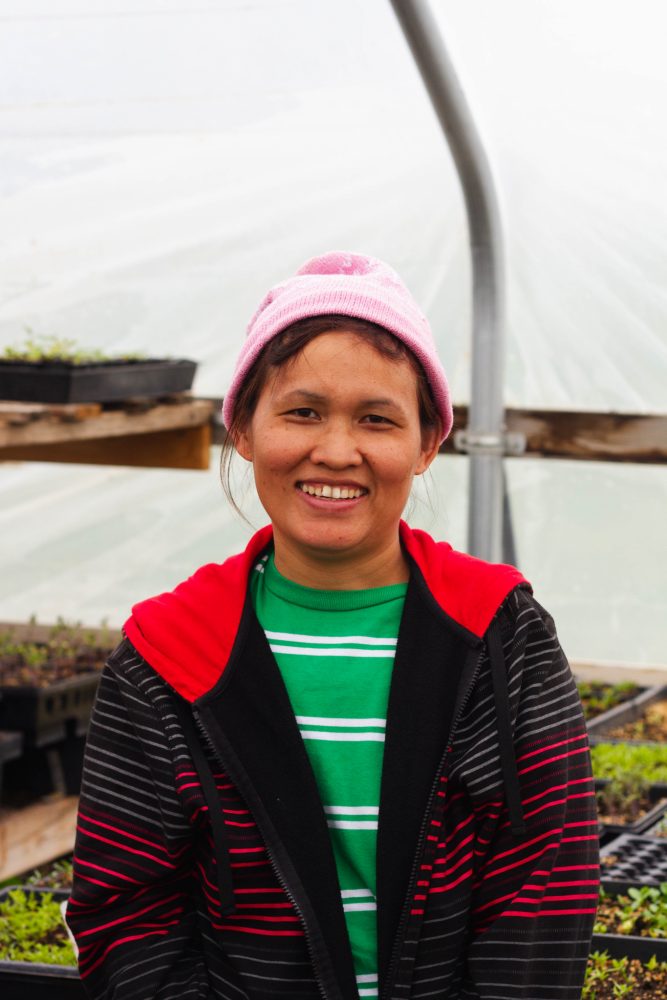The New Roots Program Helps A Refugee from Myanmar Grow and Thrive in Her New Home

My name is Biak Par, and I am from Myanmar. I grew up in a very small farming village called Nutke. I loved my village. It had a tiny population so everyone knew everyone and it made it feel like a community. I lived there for about 25 years. It wasn’t an ideal situation. We lived in a rural area so life was hard, but I was lucky to have hard-working parents and older siblings that worked on our farm. I have six siblings. The two oldest didn’t have the opportunity to go to school, they worked on the farm with my parents. Thanks to my parents and older siblings, I was able to go to school and get an education. Whenever I wasn’t at school, I was helping them with the farmwork. That was my life; school and the farm. I didn’t really think I would be a farmer forever, though.
In 2013 I came to the United States with my family, we moved to Kansas City. It was very exciting, but very stressful. Coming from a very rural village and seeing a big city for the first time was amazing. The people seemed very open-minded and friendly. I felt welcome, even though it was very difficult for me to speak English. I came to the US with a painful shoulder injury that hadn’t been properly treated when I was young. Because I wasn’t able to get it treated, I have less mobility and functioning in my left shoulder. When I saw a doctor here in Kansas they told me it was too late to find a cure for my injury, so I would have to live with the pain. I was a bit disappointed because I was expecting to find good treatment here. It was difficult to live with both my shoulder pain and my language barrier.
After being in the US for several years, I was introduced to the New Roots program by some friends. This program helped me continue my education, as well as start growing produce on a plot of land. My whole family was able to get involved, including my husband and children. I have belonged to this program for about three years, and my favorite thing to grow on my plot is lettuce mix. I also grow local vegetables that people enjoy like carrots and beans. Something that is very different between here and where I am from in Myanmar is the climate. In my farming village the weather was very consistent, so we could plan our crops accordingly. Here in the US, when I plant I usually have to transfer the seeds from the greenhouse to the land. There is a whole process to ensure that my farm is successful.
In addition to farming, I have the opportunity to sell my vegetables at the farmer’s market, and it is great that I get to have a small business of my own. I also enjoy sharing my produce with other people in the program who are from Myanmar, like me. My family benefits from our land, because we get to eat the vegetables that we don’t sell at the market. I am even looking forward to mentoring some of the new members of the New Roots program, and telling them about what I grow and what I have been doing in the past year as a member of the program.
Perhaps most importantly, this program has allowed me to work at my own pace, and with my family. This has helped relieve physical strain on my shoulder, and helps me find community even though I don’t speak very good English. Even when my shoulder hurts, I can manage my work on the farm without added stress. This in turn allows me to be a supportive mother to my children and take care of their needs.
It is my dream to one day have a house with my own big plot of land, so that I can continue to grow and sell produce, and have independence in my business.
I love being here and benefiting from the New Roots program. I feel I have been accepted into a great community, which helps me feel belonging and supports me in my aspirations.
Our team members obtain informed consent from each individual before an interview takes place. Individuals dictate where their stories may be shared and what personal information they wish to keep private. In situations where the individual is at risk and/or wishes to remain anonymous, alias names are used and other identifying information is removed from interviews immediately after they are received by TSOS. We have also committed not to use refugee images or stories for fundraising purposes without explicit permission. Our top priority is to protect and honor the wishes of our interview subjects.